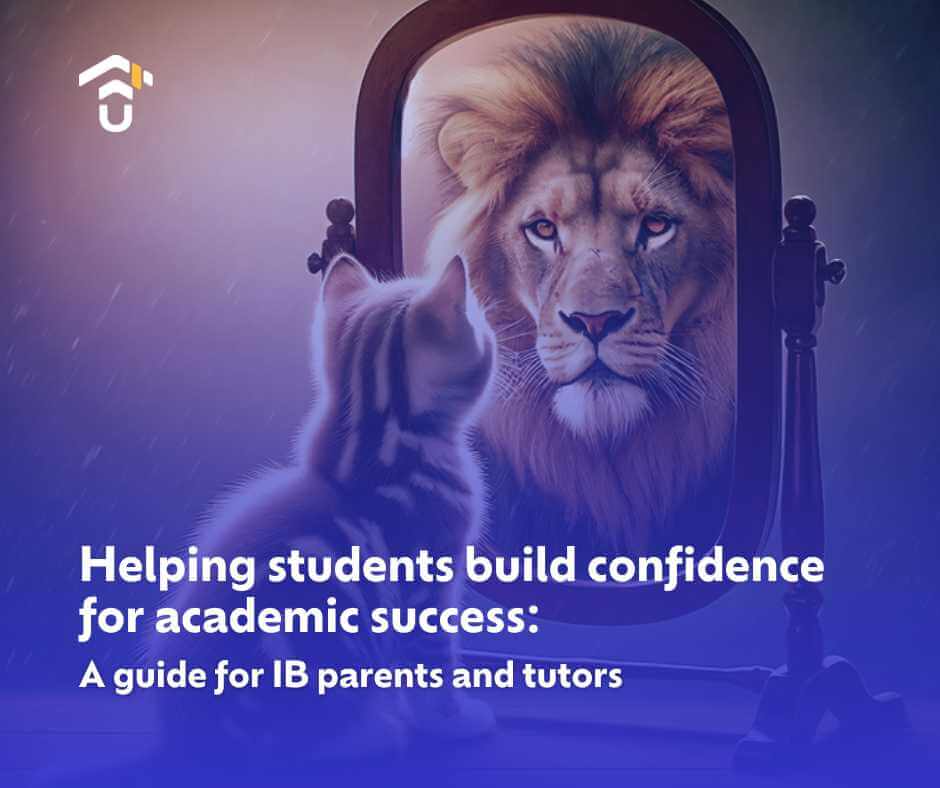Helping IB students build confidence for academic success:
A guide for IB parents and IB tutors
Written by Anzhelika Tauber
“Whether you think you can, or you think you can’t – you’re right,” said Henry Ford, and he was on to something. Research shows that confidence and how students view themselves play a huge role in their success at school.
Many students fail to reach their potential, not because they lack skills or intelligence, but because they don’t believe in themselves. One common myth is that confidence is something you’re born with—you either have it, or you don’t. This isn’t true. Confidence is a skill, and like any other skill, it can be learned and improved with practice.
In this article, we’ll explore how confidence in school affects academic performance, what science says about its impact, and ways parents, educators, and tutors can help students build confidence for academic success.

Table of Contents
Why Confidence is So Important Academically
Did you know that students’ confidence plays a crucial role in their academic achievement? Research shows that when students believe in themselves, they are more likely to succeed. In fact, one study identified confidence as a “predictor of academic performance,” meaning students with high self-confidence in learning tend to get better grades.
Confident students often:
- Believe in their ability to learn: They trust that they can develop the necessary skills to do well in school.
- Feel in control of their success: They think, “If I work hard, I can achieve my goals.”
- Set realistic goals: They recognize their strengths and work on improving their weaknesses.
- Ask for help when needed: Instead of feeling embarrassed, they view asking for help as part of the learning process.
On the other hand, students who lack confidence may hesitate to try new things, worry excessively about making mistakes, or give up too easily. This lack of confidence can hold them back from reaching their full academic potential.
How Confidence is Linked to Academic Performance
Scientists have studied confidence and its connection to academic success for years. A comprehensive review of 32 studies found a strong correlation between self-confidence in learning and student achievement. In simple terms, students who believe in themselves tend to perform better in school, while those who struggle with confidence often find academics more challenging.
Key Research Findings on Student Confidence
- Confidence builds motivation: When students believe in themselves, they are more likely to set goals and follow through.
- Past success builds future confidence: Students who have succeeded before are more likely to feel confident tackling new challenges.
- Confidence reduces fear of failure: Students with high self-confidence in learning are more willing to take risks and try difficult tasks because they believe they can improve.
The good news? Even those students, who lack confidence can build it over time with the right support and strategies.
Evidence-Backed Ways to Build Confidence in School
Confidence can be developed through practice, encouragement, and the right mindset. Research-backed strategies show that effective confidence-building for students requires more than just telling them to “believe in themselves.” Instead, a combination of small successes, a supportive learning environment, and positive reinforcement helps students build confidence.
Effective Strategies to Help Students Build Confidence
1. Celebrate Small Wins
Breaking large tasks into smaller, manageable steps helps students experience frequent successes. Each small achievement contributes to a greater sense of confidence.
2. Teach a Growth Mindset
One of the best ways to improve student self-esteem is by fostering a growth mindset for students. When students understand that intelligence and skills develop with effort, they become more resilient and open to challenges.
3. Focus on Strengths
Every student has unique strengths. Encouraging them to leverage these strengths in their academic journey can significantly boost student confidence.
4. Provide Encouragement and Positive Reinforcement
Words matter. Simple phrases like “I believe in you” or “You worked really hard on this” can go a long way in helping students gain confidence.
5. Create a Supportive Learning Environment
When students feel safe to ask questions, make mistakes, and express their thoughts without fear of judgment, they naturally become more confident learners.
By implementing these techniques, educators and parents can effectively build confidence in students, fostering both academic success and personal growth.
How Parents Can Help Build Their Child’s Confidence
Parents play an essential role in shaping their child’s confidence—far beyond school and academics. A child’s belief in their own abilities is largely influenced by their early environment, daily interactions, and the messages they receive from those closest to them. While schools and tutors can provide structured learning, the home is where confidence is nurtured on a deep, lasting level.
The good news? Building a child’s confidence doesn’t require grand gestures or complicated strategies. It’s about small, consistent efforts that, over time, reinforce the message: You are capable. You can learn. You can grow. Parents already have everything they need to support their child’s confidence—it’s in the way they praise effort, encourage independence, and model resilience in everyday situations.
Here are some practical tips:
- Be a cheerleader: Praise effort, not just achievement. Recognizing hard work builds a child’s belief in their abilities.
- Model confidence: Children learn by example. Demonstrating confidence in your own challenges helps them develop their own.
- Encourage independence: Assign age-appropriate responsibilities that allow children to develop trust in their own skills.
- Avoid harsh criticism: Gently point out areas for improvement without making a child feel incapable.
- Limit comparisons: Focus on your child’s progress rather than comparing them to peers or siblings.
By following these steps, parents can foster motivation and confidence that will support their child’s academic and personal growth. This is not a one-time lesson but a life-long task. Confidence isn’t something a child acquires overnight and keeps forever—it needs to be continuously reinforced as they grow, face new challenges, and navigate setbacks. The techniques above are simple, practical, and easily implemented in everyday life, helping parents create a supportive environment where their child feels safe to take risks, make mistakes, and develop a strong sense of self-belief.
How Tutors and Educators Can Help Build Students’ Confidence
For many students, school is more than just a place for learning—it’s a complex social environment filled with daily challenges that can deeply impact their confidence. Beyond academic pressures, students navigate peer dynamics, the fear of making mistakes in front of others, the desire to fit in, and the pressure to meet expectations from teachers, parents, and even themselves. These factors can significantly influence how they perceive their own abilities, often shaping whether they approach schoolwork with determination or hesitation.
Tutors and educators have a unique advantage in helping students build confidence because they work closely with them in a one-on-one or small-group setting. Unlike a busy classroom, where students may hesitate to ask questions out of fear of embarrassment, tutoring provides a safe space where they can express doubts, make mistakes, and receive targeted guidance without judgment.
However, confidence-building isn’t just about praising students—it’s about equipping them with strategies to overcome self-doubt. Many students struggle with the belief that intelligence is fixed or that they’re simply “bad” at certain subjects. Tutors and educators can actively challenge these limiting beliefs by helping students see their progress, guiding them through challenges step by step, and reinforcing the idea that ability grows with effort.
Here are some high-impact, research-backed Confidence Building Strategies for Tutors and Educators, to help students develop confidence in their learning abilities:
- Start with achievable tasks: Beginning with easier material helps students build confidence before progressing to more challenging topics.
- Use positive reinforcement: Recognizing effort, rather than just results, helps reinforce a student’s belief in their abilities.
- Teach study strategies: Showing students how to organize their work, break down tasks, and manage time effectively fosters academic confidence-building.
- Encourage progress, not perfection: Learning is a journey, and progress matters more than getting everything right.
- Create a relaxed, supportive environment: Making students feel comfortable in tutoring sessions can help them gain confidence in their abilities.
Improve yur grades and boost your confidence with 1:1 IB tutoring
The role of a tutor extends far beyond teaching content; it’s about teaching students how to learn, how to problem-solve, and how to trust in their own abilities. By making small, practical adjustments in their teaching approach, tutors and educators can transform a student’s self-perception, leading to lasting improvements not only in academics but in their overall confidence and resilience.
Bibliography
Bandura, A. (1986)
Social Foundations of Thought and Action. New Jersey: Prentice-Hall.
Ballane, G. (2019)
“Understanding of Self-Confidence in High School Students.” Doctoral Dissertation, Walden University.
Retrieved from https://scholarworks.waldenu.edu/dissertations/6396
Jafri, S. (2011)
“Impact of Family Climate, Mental Health, Study Habits and Self-confidence on the Academic Achievement of Senior Secondary Students.” Doctoral Dissertation, Aligarh Muslim University, Aligarh.
Retrieved from http://hdl.handle.net/10603/13522
Raniere, R., Costa, D. O., Medeiros, S. M. De, & Mazzo, A. (2020)
“Satisfaction and self-confidence in the learning of nursing students: Randomized clinical trial.”
Retrieved from https://doi.org/10.1590/2177-9465-EAN-2019-0094
International Journal of Creative Research Thoughts (IJCRT). (2021)
“Self-confidence among Students and its Impact on their Academic Performance: A Systematic Review.”
Lone, R. A. (2021)
“Self-confidence among Students and its Impact on their Academic Performance: A Systematic Review.”
International Journal of Creative Research Thoughts (IJCRT), Volume 9, Issue 5, May 2021.
Sharma, S., & Sahu, D. (2013)
“Effect of Social Networking Sites on Self Confidence.”
International Journal of Information and Computation Technology, 3(11), 1211-1216.
Retrieved from https://www.ripublication.com/irph/ijict_spl/12_ijictv3n11spl.pdf
Stevens, T. G. (2005)
Self-confidence.
Retrieved from http://www.csulb.edu.in
Welford, M. (2013)
The Power of Self-Compassion: Using Compassion-Focused Therapy to End Self-Criticism and Build Self-Confidence. Oakland: New Harbinger Publications, Inc.
Learning, Remembering, Believing: Enhancing Human Performance (1994)
National Research Council.
Retrieved from https://doi.org/10.17226/2303
How can I help my child build confidence in school?
You can help students build confidence by praising effort, encouraging independence, and creating a safe environment where they feel comfortable learning from mistakes.
What is the role of confidence in academic success?
Confidence and academic success go hand in hand. Students who believe in their abilities tend to perform better, stay motivated, and handle challenges more effectively.
How can tutors improve student confidence?
Tutors can boost student confidence by starting with easy tasks, using positive reinforcement, and teaching effective study strategies to help students feel more capable.
What are the best ways to develop student confidence?
Key methods include fostering a growth mindset for students, celebrating small wins, providing encouragement, and focusing on a student’s strengths.
Why is student confidence important for learning?
Confident students are more likely to take on challenges, ask for help when needed, and persist through difficulties—all of which contribute to academic success.

Anzhelika Tauber
Anzhelika is a PhD candidate in Genetics and a marketing consultant at U4Success from Vienna, Austria. She leads our website and social media content strategy.
